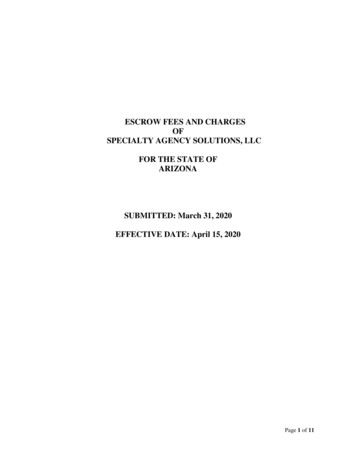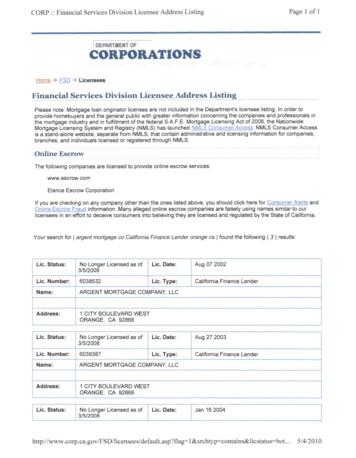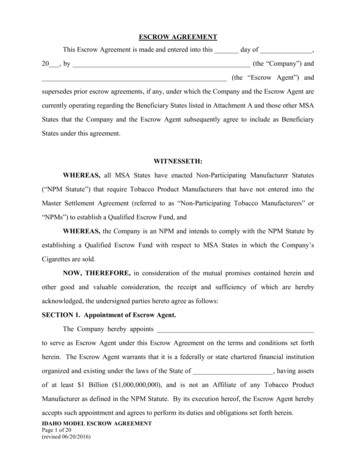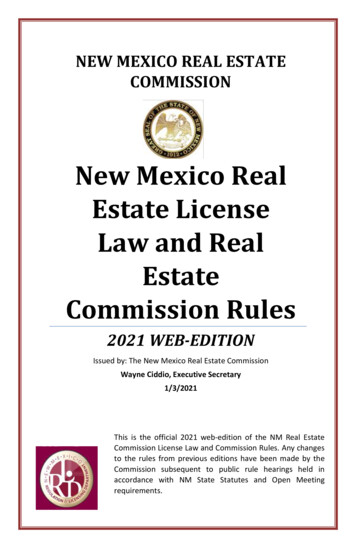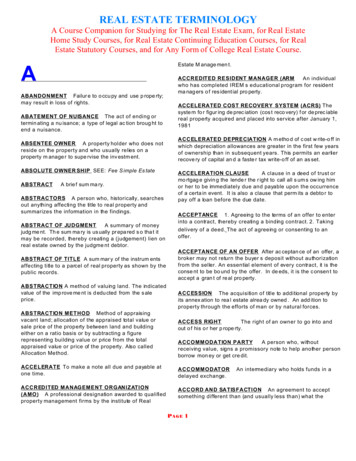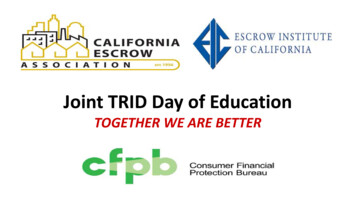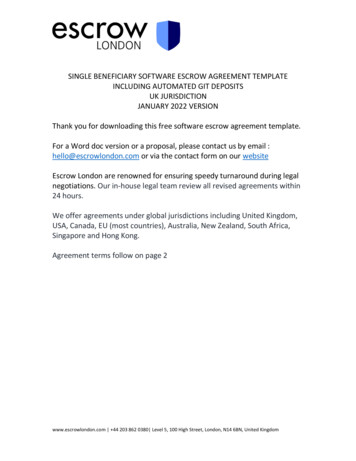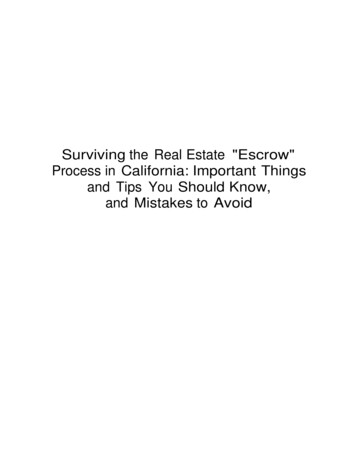
Transcription
Surviving the Real Estate "Escrow"Process in California: Important Thingsand Tips You Should Know,and Mistakes to Avoid
Table of ContentsA. Introduction and Brief Overview. . 4B. Escrow Basics. . 51. What is escrow?. 52. Why is escrow important? . 63. Who can provide escrow services in California? . 64. Are there any major differences between independent escrow agents licensedby the Department of Business Oversight and controlled escrow companiesperforming escrows under the exemption of the Financial Code’s Escrow Law?. 75. How does a real estate broker controlled escrow work? . 96. How can I identify which type of escrow holder I am working with? . 97. Who chooses the escrow holder? . 108. When does escrow typically open and how does it work? . 119. Exactly what are escrow instructions? . 1210. What types of transactions go through escrow? . 1211. What is the role of the escrow officer? . 1312. Are there any differences in the way escrows are conducted in northern andsouthern California? . 1413. Are escrow costs fixed by law; and how much do escrow services cost? . 1514. Who pays for the escrow fee?. 1515. What are closing costs? . 1616. What are prorations?. 1617. What is a closing statement? . 1718. In a typical real estate transaction, what are the buyer's and seller'sresponsibilities? . 1719. How should I take title to my property? . 1820. What documents need to be acknowledged in front of a notary?. 1821. What if I have to remit (pay or add more) funds at closing? . 1922. What do the terms "funding" and "recording" mean? . 1923. How long does an escrow take to complete? . 2024. What happens when escrow closes? . 2025. What happens when a transaction fail to close and the escrow cancels?. 2026. Are escrows for manufactured homes and/or mobilehomes different thanescrows for standard residential/single family homes? . 21C. Helpful Tips. . 211. Prepare yourself for the escrow process. 212. Carefully review, read and understand all documents before signing! . 223. Ask for an estimated closing statement up-front. . 224. Review the preliminary title report. . 235. Communicate regularly with your mortgage broker or lender about your loan. . 236. Remember that documents are time sensitive! . 247. Credits that you are owed must be communicated to the lender. . 242
D. Beware of Fraud. 251. Do your own homework and really check out your escrow holder. . 252. When possible, meet the people working for you in person. . 263. Retain a copy of everything you sign and receive. . 264. A word about Internet escrow companies. . 275. Be sure to question unexpected or last minute changes to documentsand previously held agreements. . 276. Your lender and/or mortgage broker can most competently answer questionsabout your loan. . 277. Payments made outside of escrow. . 28E. Conclusion. . 29References. 303
Surviving the Real Estate “Escrow” Process in California:Important Things and Tips You Should Know,and Mistakes to AvoidBy Wayne S. Bell, Real Estate CommissionerSummer B. Bakotich, Special Investigator CaliforniaDepartment of Real Estate, State of California1A. Introduction and Brief Overview.The sale or purchase of a single family home is often the most significant financialtransaction in a person’s lifetime. If you are buying or selling a home, or refinancing, youwill want to make certain the process is relatively stress-free and goes as smoothly andreliably as possible. In order to do that, you will want to select and use a licensed,qualified, and competitively priced escrow agent. While the escrow process in Californiais not necessarily easily understood, it is the most commonly used procedure by whichreal estate is bought, sold, and refinanced in the State. To many home buyers andsellers, escrow is more like a mysterious experience where sums of money and legaldocuments change hands, and real estate is magically transferred to another at the“close” of escrow.While escrow transactions can be and many are fairly complex (with pitfalls andcomplications for the unwary), and there are books, real estate law sources, and otherin depth informational materials that explain the principles, procedures and lawsregarding escrows, the California Department of Real Estate (“DRE”) has publishedthis informational pamphlet discussing escrow fundamentals in an effort to (i) provideyou with general escrow know-how, including the basic language and terminology, (ii)shed light on how the escrow process works, (iii) familiarize you with common practicesand expectations, and to (iv) provide you with helpful tips in selecting and managingescrow transactions and spotting potential fraud.1The authors wish to thank California attorney Michael G. Evans for his review of this pamphlet and his commentsand input. Please note that the authors are not subject matter experts in the field of escrow and, as observed in thesubstantive text, this publication is not intended as an exhaustive coverage of escrows. We know that it is a lengthytreatment of the topic, but it could have been much lengthier. The authors completed their review of the rules,customs, procedures and statutory authorities discussed and/or cited in, and the editing of, this pamphlet as ofOctober 17, 2010, and note that the laws, procedures and customs in the area of escrows are subject to change.While efforts were made to provide you with accurate and authoritative information concerning the topic of escrowsin California, this pamphlet is not a substitute for professional advice. The opinions expressed in this piece, andany errors or omissions, are those of the authors, and should not be attributed to the California Department of RealEstateor to any other person or entity.4
A Table of Contents has been provided on pages 2 and 3 above for your ease ofreference and navigation. Before you read the entirety of the pamphlet, the authors urgeyou to review the questions, helpful tips, fraud avoidance suggestions, discussion items,and points set forth in the Table of Contents and take a look at the sections of thispamphlet that address those matters that you find to be the most interesting or useful.At the end of the pamphlet, we have provided some “reference” materials for readerswho want to learn more, or who desire greater detail and/or additional information,about escrows in California.B. Escrow Basics.1. What is escrow?At its essence, escrow is the process whereby parties to the transfer or financing of realestate deposit documents, funds, or other things of value with a neutral anddisinterested third party (the escrow agent), which are held in trust until a specific eventor condition takes place according to specific, mutual written instructions from theparties. Escrow is essentially a clearinghouse for the receipt, exchange, and distributionof the items needed to transfer or finance real estate. When the event occurs or thecondition is satisfied, a distribution or transfer takes place. When all of the elementsnecessary to consummate the real estate transaction have occurred, the escrow is“closed”.Section 17003(a) of the California Financial Code defines escrow as " any transactionin which one person, for the purpose of effecting the sale, transfer, encumbering, orleasing of real or personal property to another person, delivers any written instrument,money, evidence of title to real or personal property, or other thing of value to a thirdperson to be held by that third person until the happening of a specified event or theperformance of a prescribed condition, when it is then to be delivered by that thirdperson to a grantee, grantor, promisee, promisor, obligee, obligor, bailee, bailor, or anyagent or employee of any of the latter”.For your reference, the California Escrow Law (“Escrow Law”) is contained in Division 6of the Financial Code, commencing with Section 17000, and Subchapter 9, Title 10 ofthe California Code of Regulations, commencing with Section 1700.In addition to its elusive nature, escrow transactions can be unpredictable and stressfulfor the participants. It is safe to say that you cannot fully understand and appreciate howescrow works and what to expect until you have personally been involved in an escrowtransaction. A successful escrow is usually the product of an experienced team of realestate, title, and escrow professionals working together to guide you through this shortlived, yet very important, arrangement.5
2. Why is escrow important?Escrow is a service that protects the public and minimizes the potential risk involved inany real estate transaction. With an experienced neutral third party in possession of thelegal documents and funds, which party is obligated to safeguard the instruments andfunds, buyers and sellers, as well as lenders and borrowers, can safely interact with oneanother and be assured that no legal documents will be recorded, and no funds will bereleased, until all of the conditions of the real estate contract or agreement between theparties have been completed.3. Who can provide escrow services in California?In order to perform escrow services in California, the Escrow Law states that an escrowmust be a corporation, in the business of receiving escrows for deposit or delivery, andbe licensed by the California Corporations Commissioner. However, there areexemptions provided in the Escrow Law which allow other entities and persons notlicensed by the Department of Business Oversight (“DBO”) to perform escrow services.Such escrow agents are exempt from the licensing requirements of the Escrow Lawand include the following: 1) any bank, trust company, building and loan or savings, orinsurance company under any law of this State or the United States; 2) any Californialicensed attorney who has a bona fide client relationship with a principal in a real estateor personal property transaction and who is not actively engaged in the business ofescrow; 3) any title company licensed by the California Insurance Commissioner; and 4)any real estate broker licensed by the California Department of Real Estate whileperforming acts in the course of or incidental to a real estate transaction in which thebroker is an agent or a party to the transaction and in which the broker is performing anact for which a real estate license is required.The Escrow Law also states that with respect to 2) and 4) above, the exemption ispersonal to the licensed persons listed (attorneys and real estate brokers, respectively),and those persons shall not delegate any duties other than duties performed under thedirect supervision of those persons. Also, the exemption is not available for anyarrangement entered into for the purpose of performing escrows for more than onebusiness.In the terminology of the escrow industry, all escrow agents performing escrow servicesin California are either “licensed” or “controlled” escrow companies. A "licensed"escrow company, which is also known as an “independent” escrow company, islicensed by the DBO. This license can only be obtained after the escrow company hasmet and satisfied all of the licensing requirements set forth by the Escrow Law, whichare enforced by the DBO. A "controlled" escrow, which may be known as a “nonindependent” escrow, is not licensed by the DBO. A controlled escrow could be ownedand operated by any of the persons or entities mentioned above, such as a real estatebroker or title insurance company. The licensing and regulation of controlled escrowsdepends on the jurisdiction of the licensing and regulatory authority that they are6
operating under. Therefore, the licensing requirements, laws, and regulations that theyare subject to vary widely.4. Are there any major differences between independent escrow agents licensedby the Department of Business Oversight and controlled escrow companiesperforming escrows under the exemption of the Financial Code’s Escrow Law?Yes, there are many differences between independent and non-independent escrowswhich largely lie in the licensing requirements and laws that govern them. The DBO'swebsite (www.dbo.ca.gov) lists the requirements for obtaining a license to do businessas an independent escrow. These requirements are much more stringent than thelicensing requirements placed on non-independent escrows. One of those requirementsis membership in the Escrow Agents’ Fidelity Corporation (EAFC) if the escrowcompany will be engaging in escrows specified under Section 17312 (c) of the FinancialCode, including but not limited to, real property escrows, bulk escrows, escrowsinvolving manufactured homes and mobile homes, and fund or joint control escrows.The EAFC indemnifies member escrow companies against loss of trust obligationscaused by or resulting from the fraudulent or dishonest abstraction, misappropriation, orembezzlement of such obligations by an officer, director, trustee, stockholder, manager,or employee of a member. The coverages schedule for losses is set forth in Section17314 of the Financial Code. Pursuant to the current schedule (as of October 17,2010), the minimum coverage by EAFC for each licensed location shall be 1,000,000and the maximum coverage for each licensed location shall be 5,000,000 2 . Thoseindividuals who have a history of misconduct or criminal record for crimes involvingdishonesty are denied membership in EAFC and are restricted from working for amember escrow company.If an escrow company handles transactions not listed under Section 17312 (c) of theFinancial Code, they are required to file a fidelity bond with the Commissioner for eachofficer, director, trustee, or employee in coverage of not less than 125,000. Anotherlicensing requirement mandates that an “independent” escrow agent must have one ormore persons with at least five years of responsible escrow experience on site at themain licensed location during business hours. All other branch offices must have one ormore persons with at least four years of responsible escrow experience on site. Otherrequirements include background checks and fingerprinting for each officer, director,manager or employee of the escrow company, surety bonding, proof of minimumfinancial stability requirements, a required audit performed by a licensed CPA, andpayment of application fees and DBO assessments.2Claims against the EAFC may only be made by EAFC member escrows. However, under Sections 17202-17203of the Financial Code, escrow customers/consumers can make claims against a DBO escrow licensee’s bond. Itshould also be noted that reference to EAFC membership in any member escrow advertisements are subject to therestrictions of Section 17346 of the Financial Code against representing that trust obligations of escrow agents are“protected”, “guaranteed” or “insured”, and must have a clear and conspicuous statement that EAFC is a privatecorporation and not a government agency.7
The licensing requirements of non-independent escrow companies are much lessintensive. For example, under the Real Estate Law, only real estate licensee applicantsundergo a background and fingerprint check. Additionally, an escrow manager orofficer need not be licensed by the Department of Real Estate (DRE) to work for abroker escrow division, and such a manager or officer does not have to apply for orundergo any special licensure. Because a real estate broker may hire anyone to workfor his broker escrow division and that individual does not have to be licensed, thepotential escrow manager, officer, or assistant working for the real estate broker is notby law subjected to any fingerprint or background check. Another difference is the lackof bonding requirements placed upon non-independent escrow companies. Forexample, unlike the fidelity and surety bonding requirements for DBO licensed escrowagents, a real estate broker only has to maintain a fidelity bond if an unlicensed personis a signatory on the trust account. If there are no unlicensed individuals on the trustaccount, a real estate broker is not subject to any fidelity bond requirement. Finally,there are no minimum work experience requirements for individuals who are working fora real estate broker as escrow managers and officers. Thus, these individuals do notneed any escrow experience or history of working in an escrow company. If the escrowmanager or officer is a real estate licensee, then they are subject to the normal realestate licensing requirements. While there is no separate bonding requirement for annon-independent real estate broker controlled escrow, with the exception mentionedabove, the DRE does have a Recovery Account, which is a “victim’s fund” of last resort,and it can pay victims of intentional fraud that has been perpetrated by real estatebrokers. Under current law, the Recovery Account’s payout limits are 50,000 pertransaction and up to 250,000 per licensee.In addition to the differences in licensing, another major difference between anindependent escrow company and non-independent escrow company is that a DBOlicensed escrow company can perform the escrow for any principal, broker, or person,whereas a DRE or California Department of Insurance (CDI) regulated escrow can onlyperform escrow functions when they are a party to the transaction. This is the reasonwhy DBO licensed escrow companies are referred to as "independent" escrows -- theyare a neutral party in the transaction, unlike a DRE or CDI escrow company which isonly able to perform those functions when they are performing other related functionsin the transaction under the authority of their real estate or title insurance license.Finally, independent escrow companies are subject to the requirements and regulationsof the Escrow Law, and certain requirements of the Civil Code, while DRE or CDIcontrolled escrows are subject to the bodies of law that govern real estate licenseesand title insurance and underwritten title companies, respectively, as well as certainapplicable Civil Code mandates.3 Therefore, the ways in which they are regulated andenforced vary greatly.Financial Code Section 17006 exempts DRE and CDI licensees from the entire Escrow Law, yet some casedecisions refer to the Escrow Law or portions of it (e.g., Section 17003’s escrow definition, which actuallycodified language from an historic case, is applied almost verbatim). Regarding Civil Code Sections pertaining toescrows and escrow holders and agents, see 1057-1057.7, 1103.22, 1812.210, 1812.214, 1812.314, 2995, and3110.5.38
5. How does a real estate broker controlled escrow work?A real estate “broker controlled" escrow, also known as a "broker run" escrow, meansthat a real estate broker is conducting the escrow while performing acts in the course ofor directly incidental to a real estate transaction in which the broker is a party or in whichthe broker is an agent performing an act for which a real estate license is required. Forexample, a real estate broker representing a buyer in the purchase of real property mayalso perform escrow services in connection with that purchase pursuant to theexemption of the Escrow Law. However, if the real estate broker were performingescrow services with respect to a transaction where they are not a party or not anagent performing underlying real estate services, they would be unlawfully performingescrow services and in violation of the Escrow Law. Under the latter scenario, the DREcould issue a Desist and Refrain Order against that broker for engaging in an activitythat is in violation of Division 6 of the Financial Code and for not being exempt underthe Escrow Law.Because non-independent escrows have restrictions under the Escrow Law, you shouldbe aware of these restrictions and properly identify and confirm the escrow's licensestatus with their regulatory agency before working with the person or company.Recently, a regulation of the California Real Estate Commissioner was adopted whichrequires that if a real estate broker is using a fictitious business name with the word"escrow" in it, the name must also include the term "non-independent broker escrow" inany advertising, signs or electronic promotional material. For example, if ABC Realtywere also doing business as ABC Escrow, they would have to state that they are "ABCEscrow, a non-independent broker escrow." This is important for you to know sincesome names of escrows may suggest that they are doing business as a licensed,independent escrow company when in reality, they are not independent.It is to be noted here that real estate brokers who conduct broker escrows areresponsible for those escrows, cannot delegate that responsibility, must follow theCalifornia Real Estate Law (which is set forth in Sections 10000, et seq. of the Businessand Professions Code, and which includes Regulations of the Real EstateCommissioner) with respect to the handling and accounting of monies provided to thebrokers in trust, and appropriate discipline can be imposed against those licensees bythe DRE where violations of the law have occurred.6. How can I identify which type of escrow holder I am working with?Pursuant to 17403.4 of the Financial Code, all written escrow instructions andinstructions electronically transmitted over the Internet must include the escrow’slicense name and the identity of the supervising agency. You will most likely find anescrow company's license number along with this information. In the event you areunable to locate the license name, agency information, or license number disclosure, besure to ask your escrow officer for this information. You as the escrow consumer havea right to know if the company handling your escrow is licensed and in good standingwith the department which regulates it. In order to verify this information, you will need9
to check the status of the escrow. With the license name, number and/or agencyinformation, you will be able to call the regulatory agency or search that department'swebsite to determine the license status of the escrow. You will also be able to see if theescrow has ever been the subject of any disciplinary action. For example, if the escrowwas previously revoked or suspended, or even unlicensed altogether, this is pertinentinformation you need to know if you have enlisted this escrow to hold your money intrust and facilitate an important real estate transaction. Therefore, always check thestatus of an escrow prior to working with them.The following agencies can assist you when inquiring about the licensing status of anescrow:For independent escrow companies, contact the Department of Business Oversightat (866) ASK-CORP or go to www.dbo.ca.gov.For broker controlled escrows, contact the Department of Real Estate at (877) 373-4542or go to www.DRE.ca.gov.For title insurance/underwritten title companies performing controlled escrows, contactthe California Department of Insurance at (800) 927-HELP or go towww.insurance.ca.gov.7. Who chooses the escrow holder?The choice of escrow is normally agreed upon by the principals to a real estatetransaction and reflected in writing in the purchase contract. A seller may elect tochoose "ABC Company" and the buyer may choose "DEF Company," but both partiesmust ultimately agree, like they must on all terms and conditions of a sale. If a realestate broker is involved, it may be a common practice for the broker to recommend anescrow company, especially if the broker continually does business with a particularescrow officer or company. With a refinance transaction, if you are a borrowerrefinancing your property and working with a mortgage broker, it is usually the brokerwho will select and/or recommend an escrow provider for you. However, while a realestate broker may suggest an escrow holder, he or she may not designate an escrowholder as a condition precedent to a transaction.It is also important to note that there are laws which prohibit the payment of referralfees, rebates, and/or kickbacks between escrow, title, and real estate companies, forthe referral of business. Except for normal compensation between an escrow companyand its employees, Section 17420 of the Financial Code provides that for those underthe jurisdiction of the Escrow Law, it shall be unlawful for any person who pays over toany other person any commission, fee, or other consideration for referring, soliciting,handling, or servicing escrow customers or accounts. Basically, escrow holders areprohibited by law from the giving of any consideration to a party as an inducement forreceiving an escrow. There are comparable laws that prohibit referrals fees and rebatesthat govern real estate brokers and title insurance companies as well.10
Please remember that when it comes down to the selection of the escrow holder, you asthe consumer always have the right to choose an escrow that is professional,competent, reasonably priced, and which will fulfill your transactional needs.8. When does escrow typically open and how does it work?In the typical escrow, the principals to the real estate transaction that requires anescrow (borrower, lender, buyer and/or seller) cause escrow instructions to be created,signed, and delivered to the escrow officer. In the case of a real estate sale/purchase,escrow usually opens when a fully executed purchase agreement has been delivered toan escrow holder. The good faith deposit or initial down payment may or may not bedeposited at the same time. The delivery of the signed purchase agreement and/oraccompanying deposit to an escrow company is usually facilitated by the listing orselling broker involved. Upon receipt of a fully executed purchase contract and/or goodfaith deposit, the escrow officer will normally assign the transaction an escrow number.When calling your escrow officer with questions or concerns, it is helpful to have thisescrow number handy because this will allow the escrow officer to locate your file moreeasily.The applicable broker will typically provide the escrow officer with important informationregarding the transaction, such as the names and contact information for the principals,lending and title information, selection of service providers, and other necessary details.After escrow opens, the escrow officer will order a real property title search with the titlecompany designated by the parties, if this has not already been done by the listingbroker, and prepare escrow instructions. These instructions are normally pre-approvedby the brokers involved in the transaction. Once they are deemed to be error free andfinalized, the instructions are sent to the parties for signature. These instructionsessentially tell the escrow officer what to do and when to do it, and basically give theescrow officer the authority to act. It is worth pointing out that there are some aspectsof a real estate transaction that are not part of the escrow. For instance, the purchaseagreement contains several items that are not handled by escrow holders, such asbuyer and seller agreements regarding property fixtures, personal property, removal ofcontingencies, liquidated damages, arbitration and mediation. It is important toremember that if you have specific questions about the purchase agreement, youshould contact your licensed real estate broker or licensed attorney.Basically, the escrow officer can only process the escrow in
real estate is bought, sold, and refinanced in the State. To many home buyers and sellers, escrow is more like a mysterious experience where sums of money and legal documents change hands, and real estate is magically transferred to another at the "close" of escrow. While escrow transactions can be and many are fairly complex (with pitfalls and


